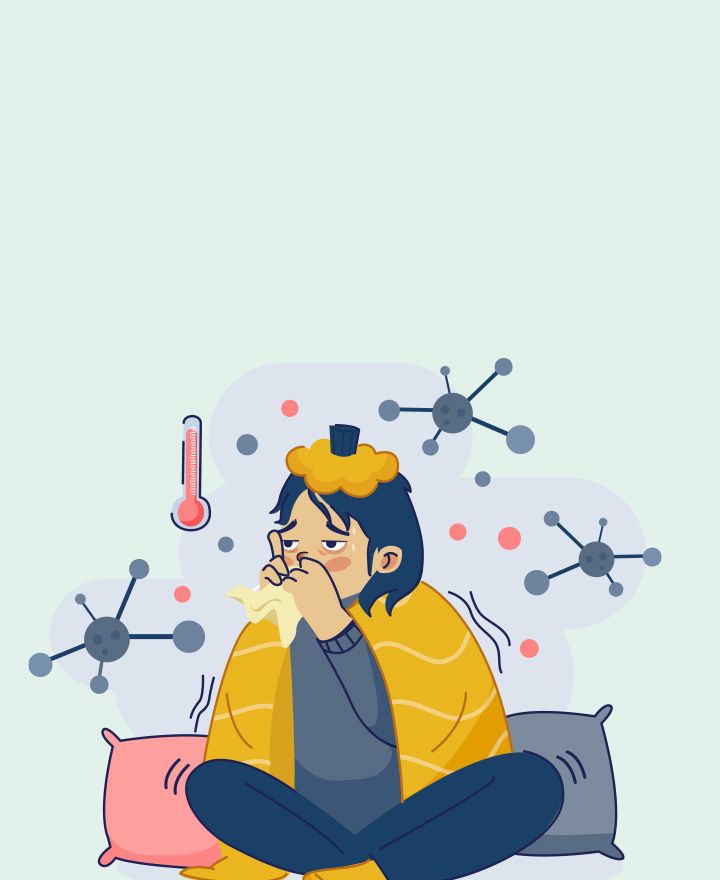

Waterborne Illnesses: Causes & Symptoms
Waterborne diseases are contracted through the intake of contaminated water or contact with it. Waterborne illnesses are a global health issue and hence it is essential to know about the predominant diseases that affect people frequently so that you can easily identify the symptoms and seek medical attention if necessary. Read on to know more.
Common Waterborne Diseases
Some of the most common diseases caused by contaminated water include the following —
• Cholera:
It is a bacterial disease, which is caused by vibrio cholerae and it results in severe diarrhoea and dehydration.
• Typhoid Fever:
Caused by Salmonella typhi, it is characterised by high fever, fatigue, and pain in the abdomen.
• Dysentery:
It is severe diarrhoea with blood and it can be due to bacteria/viruses/parasites.
• Hepatitis A:
A waterborne viral disease that primarily affects the liver and results in symptoms such as yellowing of skin, weakness and pain in abdomen.
Causes of Waterborne Illnesses
Illnesses caused by contaminated water are primarily due to the presence of pathogens like bacteria, viruses, and parasites. Some common causes include —
• Poor Sanitation:
Lack of proper waste disposal and sanitation facilities can contaminate water sources.
• Industrial Waste:
Discharge of untreated industrial waste into waterbodies introduces toxic chemicals and pathogens.
• Agricultural Runoff:
Pesticides and fertilisers used in farming can seep into water sources, leading to contamination.
• Natural Disasters:
Floods and hurricanes can disrupt clean water supplies, merging clean and contaminated water.
Symptoms
Recognising the symptoms of water-related diseases can lead to early intervention and prevention of further spread. Common symptoms include —
• Diarrhoea:
Often severe and persistent, leading to dehydration.
• Vomiting:
Frequent vomiting can contribute to fluid loss and dehydration.
• Abdominal Pain:
Cramping and pain in the stomach.
• Fever:
High body temperature, indicating an infection.
• Jaundice:
Yellowing of the skin and eyes, particularly in cases of Hepatitis A.
Prevention Strategies
Preventing illnesses is essential for maintaining good health. Here are some strategies —
• Boiling Water:
This kills most pathogens, making water safe to drink.
• Using Water Filters:
Using filters can help remove contaminants from drinking water.
• Practising Good Hygiene:
Washing hands properly with soap and water can prevent the spread of pathogens.
• Proper Sanitation:
Ensuring proper waste disposal and avoiding open defecation is essential.
• Avoiding Contaminated Water Sources:
Steering clear of swimming or bathing in contaminated water.
Conclusion
Understanding the causes, symptoms, and prevention of waterborne diseases is crucial for protecting health. By practising good hygiene, ensuring clean water supplies, and being aware of the common diseases caused by contaminated water, we can significantly reduce the risk of illnesses caused by contaminated water. Stay informed, stay healthy, and help prevent the spread of water-related diseases.
One of the important components of our overall wellness is also being financially secured. Healthcare emergencies can happen any time, but a good health insurance policy can protect you from such uncertain situations. To know more about Wellness and other health related tips, visit the wellness corner.
Source: carehospitals.com, health.state.mn.us
Disclaimer: This blog provides general information and discussions about health and related subjects. The information and other content provided in this blog, website or in any linked materials are not intended and should not be considered, or used as a substitute for, medical advice, diagnosis or treatment. Kindly contact your Doctor before starting a new medicine or health regime.
Related Articles
What Are The Best Health Tips For Monsoon?
Managing Breathing Problems In The Rainy Season
Common Monsoon Diseases And How To Prevent Those?
Diet Tips Pregnant Women Should Follow In Rainy Season
Published on July 24, 2024














 Health Insurance
Health Insurance  Travel Insurance
Travel Insurance  Car Insurance
Car Insurance  Cyber Insurance
Cyber Insurance  Critical Illness Insurance
Critical Illness Insurance
 Pet Insurance
Pet Insurance
 Bike/Two Wheeler Insurance
Bike/Two Wheeler Insurance  Home Insurance
Home Insurance  Third Party Vehicle Ins.
Third Party Vehicle Ins.  Tractor Insurance
Tractor Insurance  Goods Carrying Vehicle Ins.
Goods Carrying Vehicle Ins.  Passenger Carrying Vehicle Ins.
Passenger Carrying Vehicle Ins.  Compulsory Personal Accident Insurance
Compulsory Personal Accident Insurance  Travel Insurance
Travel Insurance  Rural
Rural